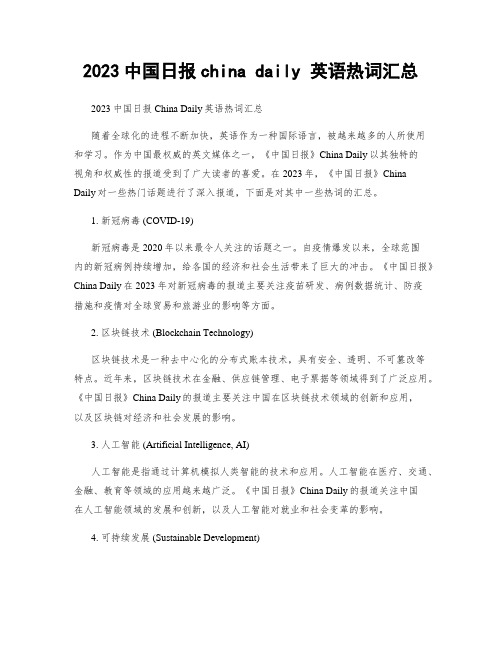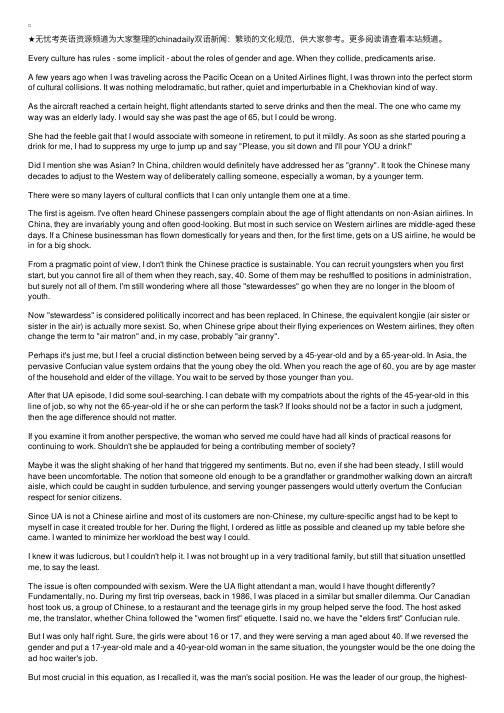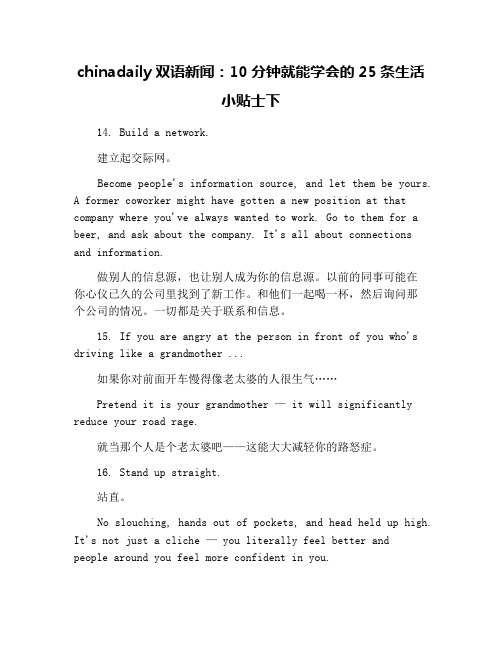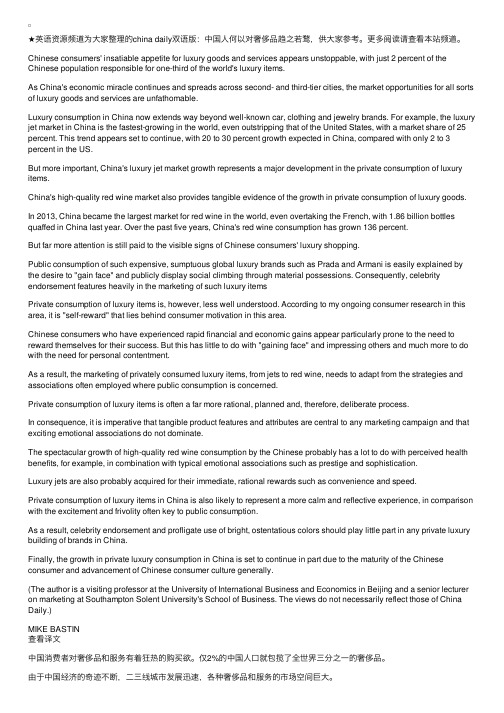china daily 双语新闻 研究:老年人买便宜货可增强记忆力
双语新闻:研究表明午睡有助于巩固记忆

双语新闻:研究表明午睡有助于巩固记忆A 90-minute nap could help lock in long-term memory, a research shows.If you want to remember the information in this article, take a nap.New research conducted by brain researcher Avi Karni of the University of Haifa in Israel explores the possibility that naps help lock in sometimes fleeting long-term memories. A 90-minute daytime snooze might help the most, the study finds.“We still don’t know the exact mechanism of the memory process that occurs during sleep, but the results of this research suggest it is possible to speed up memory consolidation,” Karni said.Long-term memory refers to memories that stay with us for years, such as “what” memories — a car accident that happened yesterday —or “how to” memories, suc h as one’s learned ability to play the drums.Karni, who co-authored the study in a recent issue of the journal Nature Neuroscience, instructed participants to learn a complex thumb-tapping sequence, then split the study subjects into two groups: one that napped for an hour, and one that didn’t. The people who took an afternoon snooze showed sizeable improvement in their performance by that evening.“After a night’s sleep the two groups were at the same level, but the group that slept in the afternoon improved much faster than the group that stayed awake,” Karni said.And the study also showed just how much faster a 90-minute nap could help lock in long-term memories.“Daytime sleep can shorten the time ‘how to’ memory becomes immune to interference and forgetting,” Karni said. “Instead of 6 to 8 hours, the brain consolidated the memory during the 90-minute nap.”如果你想记住这篇文章的内容,那就先打个盹儿吧。
2023中国日报china daily 英语热词汇总

2023中国日报china daily 英语热词汇总2023中国日报China Daily英语热词汇总随着全球化的进程不断加快,英语作为一种国际语言,被越来越多的人所使用和学习。
作为中国最权威的英文媒体之一,《中国日报》China Daily以其独特的视角和权威性的报道受到了广大读者的喜爱。
在2023年,《中国日报》ChinaDaily对一些热门话题进行了深入报道,下面是对其中一些热词的汇总。
1. 新冠病毒 (COVID-19)新冠病毒是2020年以来最令人关注的话题之一。
自疫情爆发以来,全球范围内的新冠病例持续增加,给各国的经济和社会生活带来了巨大的冲击。
《中国日报》China Daily在2023年对新冠病毒的报道主要关注疫苗研发、病例数据统计、防疫措施和疫情对全球贸易和旅游业的影响等方面。
2. 区块链技术 (Blockchain Technology)区块链技术是一种去中心化的分布式账本技术,具有安全、透明、不可篡改等特点。
近年来,区块链技术在金融、供应链管理、电子票据等领域得到了广泛应用。
《中国日报》China Daily的报道主要关注中国在区块链技术领域的创新和应用,以及区块链对经济和社会发展的影响。
3. 人工智能 (Artificial Intelligence, AI)人工智能是指通过计算机模拟人类智能的技术和应用。
人工智能在医疗、交通、金融、教育等领域的应用越来越广泛。
《中国日报》China Daily的报道关注中国在人工智能领域的发展和创新,以及人工智能对就业和社会变革的影响。
4. 可持续发展 (Sustainable Development)可持续发展是指在满足当前需求的同时,不破坏自然资源和生态环境,以满足后代需求的发展模式。
《中国日报》China Daily的报道关注中国在可持续发展方面的努力和成就,以及可持续发展对全球环境保护和经济发展的重要性。
5. 人类命运共同体 (Community of Shared Future for Mankind)人类命运共同体是习近平主席提出的概念,强调全球各国应共同合作,共同应对全球挑战,共同促进人类的共同发展和繁荣。
chinadaily双语新闻:繁琐的文化规范

★⽆忧考英语资源频道为⼤家整理的chinadaily双语新闻:繁琐的⽂化规范,供⼤家参考。
更多阅读请查看本站频道。
Every culture has rules - some implicit - about the roles of gender and age. When they collide, predicaments arise.A few years ago when I was traveling across the Pacific Ocean on a United Airlines flight, I was thrown into the perfect storm of cultural collisions. It was nothing melodramatic, but rather, quiet and imperturbable in a Chekhovian kind of way.As the aircraft reached a certain height, flight attendants started to serve drinks and then the meal. The one who came my way was an elderly lady. I would say she was past the age of 65, but I could be wrong.She had the feeble gait that I would associate with someone in retirement, to put it mildly. As soon as she started pouring a drink for me, I had to suppress my urge to jump up and say "Please, you sit down and I'll pour YOU a drink!"Did I mention she was Asian? In China, children would definitely have addressed her as "granny". It took the Chinese many decades to adjust to the Western way of deliberately calling someone, especially a woman, by a younger term.There were so many layers of cultural conflicts that I can only untangle them one at a time.The first is ageism. I've often heard Chinese passengers complain about the age of flight attendants on non-Asian airlines. In China, they are invariably young and often good-looking. But most in such service on Western airlines are middle-aged these days. If a Chinese businessman has flown domestically for years and then, for the first time, gets on a US airline, he would be in for a big shock.From a pragmatic point of view, I don't think the Chinese practice is sustainable. You can recruit youngsters when you first start, but you cannot fire all of them when they reach, say, 40. Some of them may be reshuffled to positions in administration, but surely not all of them. I'm still wondering where all those "stewardesses" go when they are no longer in the bloom of youth.Now "stewardess" is considered politically incorrect and has been replaced. In Chinese, the equivalent kongjie (air sister or sister in the air) is actually more sexist. So, when Chinese gripe about their flying experiences on Western airlines, they often change the term to "air matron" and, in my case, probably "air granny".Perhaps it's just me, but I feel a crucial distinction between being served by a 45-year-old and by a 65-year-old. In Asia, the pervasive Confucian value system ordains that the young obey the old. When you reach the age of 60, you are by age master of the household and elder of the village. You wait to be served by those younger than you.After that UA episode, I did some soul-searching. I can debate with my compatriots about the rights of the 45-year-old in this line of job, so why not the 65-year-old if he or she can perform the task? If looks should not be a factor in such a judgment, then the age difference should not matter.If you examine it from another perspective, the woman who served me could have had all kinds of practical reasons for continuing to work. Shouldn't she be applauded for being a contributing member of society?Maybe it was the slight shaking of her hand that triggered my sentiments. But no, even if she had been steady, I still would have been uncomfortable. The notion that someone old enough to be a grandfather or grandmother walking down an aircraft aisle, which could be caught in sudden turbulence, and serving younger passengers would utterly overturn the Confucian respect for senior citizens.Since UA is not a Chinese airline and most of its customers are non-Chinese, my culture-specific angst had to be kept to myself in case it created trouble for her. During the flight, I ordered as little as possible and cleaned up my table before she came. I wanted to minimize her workload the best way I could.I knew it was ludicrous, but I couldn't help it. I was not brought up in a very traditional family, but still that situation unsettled me, to say the least.The issue is often compounded with sexism. Were the UA flight attendant a man, would I have thought differently? Fundamentally, no. During my first trip overseas, back in 1986, I was placed in a similar but smaller dilemma. Our Canadian host took us, a group of Chinese, to a restaurant and the teenage girls in my group helped serve the food. The host asked me, the translator, whether China followed the "women first" etiquette. I said no, we have the "elders first" Confucian rule. But I was only half right. Sure, the girls were about 16 or 17, and they were serving a man aged about 40. If we reversed the gender and put a 17-year-old male and a 40-year-old woman in the same situation, the youngster would be the one doing the ad hoc waiter's job.But most crucial in this equation, as I recalled it, was the man's social position. He was the leader of our group, the highest-ranking official. So, it didn't matter whether it was a he or she. Other people would take care of his or her plate as a courtesy.What if the person helping him with the food was his senior in age but not in position? That would be an interesting situation. If we transform the teenage girl into a 50-year-old woman, would it be culturally appropriate for him to sit there and be served? Maybe, I guess. But if she was over 60, I would say he would have squirmed in his seat.Adults help children because the latter are small and weak. Youngsters yield to those senior in generation because the latter have earned it and the practice has evolved into a custom here in China and other Asian countries under strong Confucian influence. In China it is being subverted - in actuality if not in name - by the single children who act as "little emperors" and tend to lord it over their parents and grandparents.I guess it's the same process for women's status in the West. They were traditionally considered weak and the object of protection and chivalry strengthened it into an expectation. Here in China, men do not hold doors for women and the level of equality on a Chinese bus or subway train is nothing short of staggering. What do Western feminists make of that? Is it progress as women are obviously no longer perceived as weaker than men, or is it a gross manifestation of rudeness toward the fair sex?A recent report of a squabble on a bus may help illustrate the complexity of real life over ordained principles. A young woman had a seat and in came an elderly man who planted himself in front of her.Good manners by Chinese custom dictate she offer her seat to him.She did not budge. And she had a good reason, which others could not easily detect. She was two months pregnant. By Chinese etiquette, pregnant women enjoy the right to a seat just as the elderly or those carrying babies. The elderly gentleman, without that piece of information, demanded she give up the seat, and she, probably unwisely, did not reveal her pregnancy until a scuffle had broken out.Who should have been given priority in this situation, the two-month pregnant woman or the frail gentleman? (I assume he was frail.) There is no rule about which of these two demographics should get more "respect".The right thing, as I would have figured, was that she told the truth as soon as he asked for the seat and the person sitting next to her should have graciously offered his or her seat to the elderly man.Culture, unlike science, should have rules but should accommodate exceptions as well.By Raymond Zhou ( China Daily) 查看译⽂每种⽂化都有⾃⾝的规范,有些关于性别和年龄的规范是潜在的。
中国日报双语版2015.08.07

【Highlights】>Property taxes coming soon 房地产税最快2017通过>Ozone pollution in Shanghai 上海连续11天臭氧污染>Ning wins 100m freestyle gold 宁泽涛夺100米自由泳金牌>Coolest bookstore worldwide CNN评全球17家最酷书店\南京先锋书店中国最美>US OKs first 3D-printed pill 美批准首款3D打印药物>Better memory helps liars 研究:撒谎的孩子更聪明>Natural look frightens groom 新娘素颜吓坏新郎被告>Bottled air goes popular 英贩售机出售瓶装空气【Notice】>Property taxes coming soon 房地产税最快2017通过The Standing Committee of the 12th National People's Congress(NPC), China's top legislature, has included Property Tax Law in alegislation plan released this week. The NPC said the method oftaxation will be discussed and is subject to change. The NPC willalso solicit opinions from experts and tax authorities. Expertssaid the property taxes law will probably be passed by 2017 andsuggested it should only be levied on a housing area of more than60 sq m per person. Analysts said the tax will help regulate theonce over-heated property market and narrow the gap between therich and the poor.十二届全国人大常委会立法规划本周公布,房地产税法正式列入其中。
chinadaily双语新闻:10分钟就能学会的25条生活小贴士下

chinadaily双语新闻:10分钟就能学会的25条生活小贴士下14. Build a network.建立起交际网。
Become people's information source, and let them be yours.A former coworker might have gotten a new position at that company where you've always wanted to work. Go to them for a beer, and ask about the company. It's all about connections and information.做别人的信息源,也让别人成为你的信息源。
以前的同事可能在你心仪已久的公司里找到了新工作。
和他们一起喝一杯,然后询问那个公司的情况。
一切都是关于联系和信息。
15. If you are angry at the person in front of you who's driving like a grandmother ...如果你对前面开车慢得像老太婆的人很生气……Pretend it is your grandmother — it will significantly reduce your road rage.就当那个人是个老太婆吧——这能大大减轻你的路怒症。
16. Stand up straight.站直。
No slouching, hands out of pockets, and head held up high. It's not just a cliche — you literally feel better andpeople around you feel more confident in you.不要没精打采的,把手从裤兜里掏出来,把头抬高。
chinadaily双语版:中国人何以对奢侈品趋之若鹜

★英语资源频道为⼤家整理的china daily双语版:中国⼈何以对奢侈品趋之若鹜,供⼤家参考。
更多阅读请查看本站频道。
Chinese consumers' insatiable appetite for luxury goods and services appears unstoppable, with just 2 percent of the Chinese population responsible for one-third of the world's luxury items.As China's economic miracle continues and spreads across second- and third-tier cities, the market opportunities for all sorts of luxury goods and services are unfathomable.Luxury consumption in China now extends way beyond well-known car, clothing and jewelry brands. For example, the luxury jet market in China is the fastest-growing in the world, even outstripping that of the United States, with a market share of 25 percent. This trend appears set to continue, with 20 to 30 percent growth expected in China, compared with only 2 to 3 percent in the US.But more important, China's luxury jet market growth represents a major development in the private consumption of luxury items.China's high-quality red wine market also provides tangible evidence of the growth in private consumption of luxury goods. In 2013, China became the largest market for red wine in the world, even overtaking the French, with 1.86 billion bottles quaffed in China last year. Over the past five years, China's red wine consumption has grown 136 percent.But far more attention is still paid to the visible signs of Chinese consumers' luxury shopping.Public consumption of such expensive, sumptuous global luxury brands such as Prada and Armani is easily explained by the desire to "gain face" and publicly display social climbing through material possessions. Consequently, celebrity endorsement features heavily in the marketing of such luxury itemsPrivate consumption of luxury items is, however, less well understood. According to my ongoing consumer research in this area, it is "self-reward" that lies behind consumer motivation in this area.Chinese consumers who have experienced rapid financial and economic gains appear particularly prone to the need to reward themselves for their success. But this has little to do with "gaining face" and impressing others and much more to do with the need for personal contentment.As a result, the marketing of privately consumed luxury items, from jets to red wine, needs to adapt from the strategies and associations often employed where public consumption is concerned.Private consumption of luxury items is often a far more rational, planned and, therefore, deliberate process.In consequence, it is imperative that tangible product features and attributes are central to any marketing campaign and that exciting emotional associations do not dominate.The spectacular growth of high-quality red wine consumption by the Chinese probably has a lot to do with perceived health benefits, for example, in combination with typical emotional associations such as prestige and sophistication.Luxury jets are also probably acquired for their immediate, rational rewards such as convenience and speed.Private consumption of luxury items in China is also likely to represent a more calm and reflective experience, in comparison with the excitement and frivolity often key to public consumption.As a result, celebrity endorsement and profligate use of bright, ostentatious colors should play little part in any private luxury building of brands in China.Finally, the growth in private luxury consumption in China is set to continue in part due to the maturity of the Chinese consumer and advancement of Chinese consumer culture generally.(The author is a visiting professor at the University of International Business and Economics in Beijing and a senior lecturer on marketing at Southampton Solent University's School of Business. The views do not necessarily reflect those of China Daily.)MIKE BASTIN查看译⽂中国消费者对奢侈品和服务有着狂热的购买欲。
china daily 双语新闻:10分钟就能学会的25条生活小贴士上
china daily 双语新闻:10分钟就能学会的25条生活小贴士上1. Primacy and recency: People most remember the first and last things to occur, and barely the middle.首尾原则:人们大都会记住最先和最后发生的事情,中间发生什么几乎不记得。
When scheduling an interview, ask what times the employer is interviewing and try to be first or last.在安排一场面试的时候,向面试官询问面试的具体时间,然后争取成为第一个或者最后一个面试的人。
2. If you work in a bar or in customer service of anykind ...如果你在酒吧里工作,或是从事任何形式的客户服务……... Put a mirror behind you at the counter. This way, angry customers who approach you will have to see themselves in the mirror behind you, and the chances of them behaving irrationally lowers significantly.……在你身后的柜台放上一面镜子。
这样,那些生气地责备你的顾客不得不看见在你背后镜子中的自己,他们作出不理智行为的几率将大大降低。
3. Once you make the sales pitch, don't say anything else.当你在推销商品时,不要多说话。
This works in sales, but it can also be applied in other ways. My boss at an old job was training me and just givingme pointers. I was working at a gym trying to sell memberships. He told me that once I got all the small talkout of the way and presented the prices, that the firstperson to talk will lose. Often there were long periods of awkward silence as the person tried to come up with some excuse, but usually they bought.这在销售中很管用,而且也能使用到其他方面。
chinadaily双语新闻:想提高算数能力你需要被电击一下
英语资源频道为⼤家整理的chinadaily双语新闻:想提⾼算数能⼒你需要被电击⼀下,供⼤家阅读参考。
Stimulating the brain with rapid pulses of electricity can improve your ability to perform mental arithmetic for up to six months, a new study has shown. ⼀项新的研究显⽰,⽤电流速脉冲刺激⼤脑可以提⾼你的⼼算能⼒,效果可长达六个⽉。
For anyone who struggles with dividing the bill at the end of a meal, there is now a way to give your brain a boost. 对于那些餐后与账单苦苦⽃争的⼈们来说,这是给你的⼤脑⼀个推动⼒的好⽅法。
Scientists have shown they can improve people’s ability to perform mental arithmetic for up to six months by giving them a short course of harmless electrical stimulation on their scalps. 科学家已经表⽰,他们能够通过⽆害的电流冲刺激头⽪,提⾼⼈们长达六个⽉的⼼算能⼒。
Volunteers who received rapid pulses of electrical current – equivalent to that from an AA battery – for just 20 minutes a day for five days saw their ability to solve calculations improve by 28 per cent. 持续五天每天20分钟接受电流刺激(相当于AA电池)的志愿者,发现他们的计算能⼒提升了28%。
chinadaily双语新闻:待用咖啡滴滴皆温情
为⼤家整理的china daily 双语新闻:待⽤咖啡滴滴皆温情,供⼤家参考:)A simple act of charity and generosity that started in a coffee shop in Naples, Italy, is spreading around the world and has become a trending topic on Sina Weibo. It’s called “Suspended Coffee”.⼀个源于意⼤利那不勒斯当地⼀家咖啡馆的⼩⼩善举正在全球范围内传播,更是成为了新浪微博的热门话题之⼀。
这就是“待⽤咖啡”。
The idea is simple: At participating cafes, you can pay for your own coffee as well as a second one, which can then be claimed later by someone in need.这个理念很简单:在加⼊此项活动的咖啡馆,你可以买两杯咖啡,⼀杯给⾃⼰,另⼀杯留给稍后需要的⼈。
In Italy, suspended coffee or “Caffe Sospeso” has been around for 100 years.在意⼤利,“待⽤咖啡”(编者注:意⼤利语称其为“Caffe Sospeso”)已有近百年的历史了。
The Neapolitan writer Luciano de Crescenzo, author of Suspended Coffee: Daily Wisdom in Small Sips, told NPR about its origins.来⾃那不勒斯的作家、《待⽤咖啡:唇齿间的点滴智慧》⼀书的作者卢西亚诺•德•克雷申佐在接受美国国家公共电台NPR采访时提起了它的起源。
高考英语最新热点时文阅读:历时十年!科学家发现这6种生活方式可减缓记忆衰退(含练习题)
Study links lifestyle to rate of memory decline.历时十年!科学家发现这6种生活方式可减缓记忆衰退英文新闻:Study links lifestyle to rate of memory declineMemory loss is a common part of aging. A decade-long study of older adults in China has found that a healthy lifestyle is linked to slower memory decline even when people carry a risky gene for Alzheimer's.The participants received assessments in 2012, 2014, 2016 and 2019. In the follow-ups, six healthy lifestyle factors were analyzed: a healthy diet (adherence to recommended food items), regular physical exercise (at least 150 minutes of moderate intensity or 75 minutes of vigorous-intensity exercises per week), active social contact (for example, seeing friends and family at least twice a week), active cognitive activity (for example, reading, writing, playing chess at least twice a week), non-smoking and never drinking alcohol.The researchers said that they studied the contribution of each lifestyle factor and their combined effects in a large sample size over an entire decade and offered important information to protect older adults against memory decline.中文新闻:历时十年!科学家发现这6种生活方式可减缓记忆衰退记忆力衰退是老年人的通病。
- 1、下载文档前请自行甄别文档内容的完整性,平台不提供额外的编辑、内容补充、找答案等附加服务。
- 2、"仅部分预览"的文档,不可在线预览部分如存在完整性等问题,可反馈申请退款(可完整预览的文档不适用该条件!)。
- 3、如文档侵犯您的权益,请联系客服反馈,我们会尽快为您处理(人工客服工作时间:9:00-18:30)。
研究:老年人买便宜货可增强记忆力
Want to boost your brainpower? Head to the shops!
Shopping can boost the brainpower of the elderly, researchers have found.
研究人员发现,购物能提高老年人的智力。
Duke University scientists found older adults seem to need extra brainpower to make shopping decisions - especially ones that rely on memory.
美国杜克大学(Duke University)的科学家们观察到,老年人在作出购物决定(尤其是那些要依靠记忆力的决定)时,似乎需要动用额外的脑力。
To do this, they discovered they use an additional brain area to remember competing consumer products and choose the better one - meaning they don't miss a bargain. Older shoppers use an additional brain area to remember competing consumer products and choose the better one - meaning they don't miss a bargain.
为了作出购物决定,老年人会用一个额外的大脑区域去记住各类产品,然后从中挑选出最优的——这意味着他们不会错过任何一件便宜货。
'The study gives a bright picture, actually,' Nichole Lighthall, who led the research, appearing Nov. 19 in the Journal of Neuroscience.
这项研究发表于11月19日的《神经科学杂志》(Journal of Neuroscience)。
项目负责人尼科尔·莱特霍尔(Nichole Lighthall)认为:“事实上,此研究能为医学界带来一个明朗的未来。
”
'It suggests that for healthy older adults, even though their memory might not be as good, they can naturally recruit other brain regions that are not typically involved in the task.
'It seems that it allows them to perform at a higher level.'
他说:“这项研究表明,对于健康的老年人来说,即使他们的记忆力略有减退,他们也能轻易调动平时很少刺激到的大脑区域。
这似乎能让他们的表现更佳。
”
The study used functional magnetic resonance imaging (fMRI) -- a noninvasive technique that indirectly measures changes in brain activity -- to scan the brains of 20 younger adults (25 years old, on average), and 22 older adults (around 70 years old) while the participants viewed pictures of consumer products with star ratings indicating their value, similar to online shopping sites like .
有20位年轻人(平均年龄25岁)和22位老年人(70岁左右)参与了该研究。
他们需要浏览一些标有价格星级的商品图片——类似于浏览亚马逊()等购物网站,与此同时,研究者用功能性磁共振成像技术(fMRI)扫描他们的大脑。
Participants were asked to 'keep shopping' by navigating from one screen to the next while trying to remember the value for each consumer product they encountered.
参与者的任务是在一张张图片被展示时“不停地购买”,同时还要记住每件商品的价格。
They then had to select the better of two competing products, such as two different sweaters, based on which was a better value.
之后,参与者要在两个竞争商品中选出较好的一个,比如在两件毛衣中选出较有价格优势的那件。
Some versions of the task were easy.
For example, participants saw the first product, then the second product, and were asked to select the better one.
(译者zoe212 编辑丹妮)。
